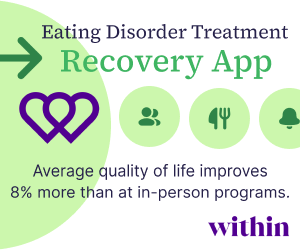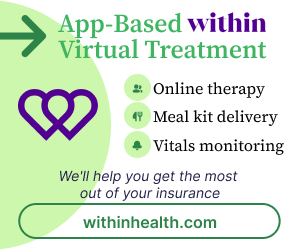- Calls to this hotline are currently being directed to Within Health or Eating Disorder Solutions
- Representatives are standing by 24/7 to help answer your questions
- All calls are confidential and HIPAA compliant
- There is no obligation or cost to call
- Eating Disorder Hope does not receive any commissions or fees dependent upon which provider you select
- Additional treatment providers are located on our directory or samhsa.gov
Eating Disorder Support Groups
An eating disorder support group is an assembly of men and/or women who gather together to provide each other with various types of help related to eating disorders. This help and support may consist of providing and evaluating relevant information about eating disorders, relating personal experiences, listening to and receiving others’ experiences, delivering empathetic understanding and forming social networks.
Click here to find a Food Addicts in Recovery Anonymous meeting near you.
A support group may also exist for the purpose of advocacy or to inform the public of important information concerning eating disorders. A support group for eating disorders upholds interpersonal contact among members in several ways.
Though a support group traditionally meets in person for conversational interactions, contact is also maintained through teleconferences, internet forums, mailing lists, and printed newsletters. No matter the method of communication and connection, a support group for eating disorders can be a helpful resource to any man or woman who is seeking to maintain their recovery.
Types of Eating Disorder Support Groups
There are two main types of eating disorder support groups, which are as follows:
- Self-Help Support Groups: In these types of support groups for eating disorders, members of the group are typically the organizers and managers of the group. This may consist of men or women who are volunteering or who have personal experience with eating disorders. Other terms for these types of groups include peer support groups, fellowships, or mutual help groups.
- Professionally Operated Support Groups: These types of groups are facilitated by professionals who control and oversee discussion and/or provide other managerial services. These types of groups may be operated through institutional settings, such as hospitals or eating disorder treatment centers. Professionals who may facilitate group discussions may include social works, psychologists, or licensed therapists. These types of support groups may function for a certain time period, and a fee for attendance may also be included.
In addition, a support group for eating disorders may be opened or closed:
- Open Support Groups: This refers to groups that allow anyone to attend a meeting or to participate. Generally, there are no criteria for being an active contributor.
- Closed Support Groups: These types of groups usually have specific criterion for participating members or may be limited to a certain number of active contributors.

Who Should Attend A Support Group
Support groups for eating disorders exist for a reason: because people need them. When anorexia, bulimia, compulsive overeating or binge eating disorder are part of the equation, this need is not confined to any one person. This is because eating disorders are so difficult and so challenging.
Say a man has a wife who is anorexic, or a mother has a daughter who is bulimic. Both the man and the mother are standing by while someone they love routinely engages in bizarre, unhealthy behaviors.
He watches his wife waste away to nothing; she hears her daughter vomiting in the bathroom. Neither one of them can stop the behaviors or help the person they love. Each feels impotent, frustrated and upset.
Who can possibly understand what these two people are going through? The answer is…others who are experiencing the same thing.
Whether a parent, a sibling, a friend or the person with the disorder, it is incredibly helpful to be surrounded by people who not only understand but can provide comfort.
Remember…There is a support group out there for you. Imagine the relief that comes when you can share your thoughts and feelings with people who really know what you are going through.
Support groups are often an invaluable component of successful eating disorder treatment. Regardless of what stage of recovery or level of treatment you may be in, support groups will be a beneficial aspect of your recovery!
What to Expect in Eating Disorder Support Groups
Support groups are similar to group therapy, however, there are key differences that set them apart. To begin, support groups are often non-professional, meaning they are not led by a therapist or clinical professional. Instead, these groups are led by the members of the group. This often leads to closer connection and increased openness as participants recognize that those around them have been, or are going through, similar struggles.
Support groups also differ from traditional therapeutic groups in that they are often non-material in that they do not follow a specific curriculum. Some may follow specific belief systems or utilize source material, however, the groups themselves are often not focused on a particular “lesson” and more free-flowing opportunities for members to discuss where they are in their journeys.
Eating disorder support groups allow individuals pursuing recovery or struggling with an eating disorder to discuss their journey in a non-judgmental and understanding space. Often, individuals with eating disorders struggle with shame and stigma associated with their beliefs and behaviors, making it difficult to reach out for help and often leading to isolation and not seeking support. Those in support groups can speak to their struggles knowing they are surrounded by others that understand the nuances of the disorder.
Benefits of Support Groups: How Important Are They for Treatment?
Eating disorder support groups can be a hugely beneficial component of the recovery plan when used in conjunction with treatment team services such as individual therapy, psychiatrist services, and dietetic support.
Even so, the lack of regulation of these groups can create concerning dynamics. Without a leader that is bound by ethical requirements of their profession, accountability becomes more challenging. For this reason, it is not uncommon to encounter some support groups that are actually more harmful than helpful. These groups may be individuals still in their illness and could be knowingly or unknowingly fixated on disorder more than recovery. Be aware of the content and messaging of any support group you attend and don’t be afraid to say a group is not for you or seek another community if one feels it may be triggering to you.
The Role of Support Groups in Eating Disorder Recovery
One of the most important factors of support groups is the connection it provides. Having a safe space to openly discuss your struggles and being around others doing the same helps individuals to feel less alone in the challenges they face. As bereavement specialist Joanne Cacciatore states, “There simply is no pill that can replace human connection. There is no pharmacy that can fill the need for compassionate interaction with others…the answer to human suffering is both within us and between us.” Eating disorder support groups provide this connection for individuals that have been longing to feel seen, understood, and supported.
Support groups also allow an opportunity for autonomy in the eating disorder recovery journey. As individuals undergo eating disorder treatment, the level of care they are in and subsequent programs they attend are often dictated by treatment professionals and insurance companies. Support groups attendance is often free and there are many, giving each individual the opportunity to choose the group that suits them and their recovery best without being told where to go or their choice being dictated by finances or insurance coverage.
As one study notes, “benefits of support groups include coping with disease, obtaining specialist knowledge and improving personal relationships [1].” These groups don’t only provide an outlet for processing but also offer an opportunity to absorb the skills and lessons learned by others. Additionally, individuals can learn to practice self-compassion as they experience the compassion and empathy of others. Many report that providing non-judgmental caring for others helped them learn how to give the same care to themselves.
Benefits of Support Groups for Family Members of Eating Disorders
Family members and loved ones of those with an eating disorder can benefit from support groups for many of the same reasons above. Supporting a loved one through the struggle of disordered eating, treatment, and recovery is both a daunting and isolating experience. Support system members often report that they do not know how to talk about their experience, they don’t feel that others truly understand and they feel lost in how to even provide this support. Support groups provide a space to explore all of these thoughts and feelings.
Support groups for loved ones also allow them the opportunity to openly and honestly discuss the emotions of resentment or bitterness that they may feel ashamed to process. It is natural to struggle with these feelings when your life, and the life of someone you love, become dictated by a disease. However, many often feel guilty expressing this frustration with their struggling loved one, as they don’t want them to feel blame or shame about their disorder. Support groups are understanding of these conflicting emotions and allow space for them to be expressed so that they don’t lead to deeper resentment and negatively impact their relationship with their struggling family member.
In-Person vs. Online Eating Disorder Support Groups: Which is Right for me?
Online support groups have become more common throughout the last 10 years and even more so since the COVID-19 pandemic in 2020. Many acquire therapy, medical, and psychiatric support virtually these days and are asking themselves if this is as effective as in-person treatment. The same questions are arising for support groups.
The benefits of online eating disorder support groups involve increased accessibility not only due to cost but due to the timing of meetings as well as locations. More meetings can be scheduled virtually and more individuals can attend without having to worry about transportation to and from. Additionally, more subgroups based on specific populations can be created in the unlimited timing and resources of the internet. For example, a group can be created for single parents of a child with an eating disorder or single parents struggling with an eating disorder themselves. This increases the likelihood of finding connections and increased support from those that are relatable to the individual’s situation.
Cons to online treatment include the lack of in-person connection, which many believe to be less impactful. Engaging in groups over the internet involves a level of detachment that allows individuals to be less present and possibly less emotionally invested in the moment with their peers. For some, this detachment might feel more comfortable because they struggle with social anxiety. For others, it might feel too disconnected.
Regardless of the overall pros and cons of online support groups, the important thing is to learn what works for you. Notice your emotional and mental response to the groups you try out, recognizing those that provide you with feelings of comfort, safety, and empowerment versus those that might feel “off” or even triggering. Recognize that committing to a support group does not mean you cannot attend other groups or change your mind if the group no longer serves you. Support groups offer incredible flexibility, use that to your advantage to find a community that supports your growth and recovery.
Resources
- McCormack, A., Coulson, N. S. (2009). Individuals with eating disorders and the use of online support groups as a form of social support. Cyberpsychology: Journal of Psychosocial Research on Cyberspace, 3(2), Article 5.
Reviewed By: Jacquelyn Ekern, MS, LPC on 1/30/20
Author
Publish Date:
Last Updated:
Articles on Support Groups
Support groups for anorexia, bulimia and binge eating disorder
Support Groups provide vital support to those suffering from disordered eating and related conditions. Understanding some of the therapeutic benefits will help you to better choose the right group for you. Practicing relational skills and developing improved coping mechanisms are some of the many benefits that may be found in a support group for eating disorders.




